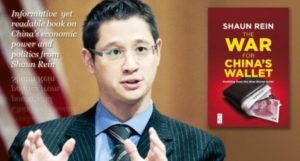 China's millennials are increasingly defining the country's consumer space, and Western fashion brands fail to appeal to them, says business analyst Shaun Rein, author of The War for China's Wallet: Profiting from the New World Order, to the South China Morning Post. Brands like Marks&Spencer failed because they focused on the middle-class, he says.
China's millennials are increasingly defining the country's consumer space, and Western fashion brands fail to appeal to them, says business analyst Shaun Rein, author of The War for China's Wallet: Profiting from the New World Order, to the South China Morning Post. Brands like Marks&Spencer failed because they focused on the middle-class, he says.The South China Morning Post:
The London-based retailer struggled to make a mark in China’s high-street fashion scene, despite a growing retail market in China and a fondness from consumers towards many other traditional British brands.
“One of their problems is they tried to sell to a middle-class consumer by creating middle-class brand positioning,” says Shaun Rein, managing director of China Market Research and author of The War for China’s Wallet: Profiting from the New World Order. “Most brands that do that in China fail.”
Marks&Spencer failed to cater to consumer tastes by offering styles that were too “middle class, suburban, UK housewife”, Rein says. Sizes for Asian body types were also not considered. Meanwhile, at locations such as Marks & Spencer’s brick and mortar stores in Beijing and Shanghai, Chinese consumers could go right next door to H&M to shop the youthful and more on-trend styles that reflect one of China’s biggest emerging markets: millennials.
Another problem for Marks & Spencer is how Chinese shoppers perceive value. Rein says Chinese consumer behaviour is defined by what he calls the “CMR Hour Glass Shopping Model”, meaning they shop both at the top and the bottom of the spending scale.
“Anything that’s not great value – it doesn’t give them prestige, it doesn’t give them status, it’s not an aspiration – is something that Chinese don’t want unless it’s dirt cheap,” he says. “So they’ll go out and buy very expensive lipstick but they’ll buy the cheapest garbage bags because they don’t want to spend money on garbage bags.
“Things in the middle like Marks & Spencer or Macy’s just sort of die because their products are not cheap, but they’re not good enough value either.”...
Macy’s, meanwhile, is still in China in a partnership to sell through Tmall that started in 2015, even though it has been struggling with brand positioning and product assortment and had to cut short its first attempt at launching an online point of sale in 2012.
“It is a great retailer in the US, but the name had no resonance here,” Rein says of Macy’s. “And it was selling Ralph Lauren – but you can buy Ralph Lauren directly here, either online or in stores, so what’s the point of going to Macy’s for Ralph Lauren?”Marketing and advertising are also critical for a company’s long-term success, Rein says, and he thinks many brands can do a lot better.
More at the South China Morning Post.“They go to the same five celebrities too often,” he says. “They all go to Jackie Chan, to Zhang Ziyi, to Angelababy, so the problem is you have these guys that are representing 10 or 20 different companies, but consumers don’t know who they’re representing any more. They might affiliate them with one brand and one brand only.”
Shaun Rein is a speaker at the China Speakers Bureau. Do you need him at your meeting or conference? Do get in touch or fill in our speakers' request form.
Are you looking for more branding experts at the China Speakers Bureau? Do check out this list.






